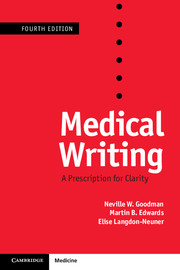Book contents
- Frontmatter
- Dedication
- Epigraph
- Contents
- Foreword
- Preface to the fourth edition
- Layout of the fourth edition
- Preface to the first edition
- Acknowledgements
- Part I Problem: the illness
- Part II Solution: symptomatic relief
- 4 Technology, changing language and authority
- 5 Guidelines to clearer writing
- 6 Spelling
- 7 Is there a better word?
- 8 Superfluous words
- 9 Imprecise words
- 10 Superfluous phrases
- 11 Trouble with short words
- 12 Use of the passive voice
- 13 Consistency: number and tenses
- 14 Word order
- 15 Punctuation
- 16 Circumlocution
- 17 Words and parts of speech for EAL writers
- 18 Clichés and article titles
- 19 Constructing sentences
- 20 Further help with sentences for EAL writers
- 21 Drawing clear graphs
- 22 It can be done
- Part III Practice: recuperation
- Appendix British–American English
- References and further reading
- Index
4 - Technology, changing language and authority
Published online by Cambridge University Press: 05 September 2014
- Frontmatter
- Dedication
- Epigraph
- Contents
- Foreword
- Preface to the fourth edition
- Layout of the fourth edition
- Preface to the first edition
- Acknowledgements
- Part I Problem: the illness
- Part II Solution: symptomatic relief
- 4 Technology, changing language and authority
- 5 Guidelines to clearer writing
- 6 Spelling
- 7 Is there a better word?
- 8 Superfluous words
- 9 Imprecise words
- 10 Superfluous phrases
- 11 Trouble with short words
- 12 Use of the passive voice
- 13 Consistency: number and tenses
- 14 Word order
- 15 Punctuation
- 16 Circumlocution
- 17 Words and parts of speech for EAL writers
- 18 Clichés and article titles
- 19 Constructing sentences
- 20 Further help with sentences for EAL writers
- 21 Drawing clear graphs
- 22 It can be done
- Part III Practice: recuperation
- Appendix British–American English
- References and further reading
- Index
Summary
There is no form of prose more difficult to understand and more tedious to read than the average scientific paper.
(Francis Crick, 1916–2004. The astonishing hypothesis: the scientific search for the soul. New York, Charles Scribner’s Sons, 1994.)We have chosen the approach (see p. 1) of encouraging good writing by examining bad writing. This necessarily means that we are critical of much that we read, but medical writers must not take offence or feel belittled: it is not them but the writing we encounter in the journals that upsets us. We know that it is not their intention to write the way they do, and that they may well not even be aware of the way they write, having copied the style unconsciously from what they read. We realize that many medical writers have more on their minds than their writing. But when Francis Crick, whose co-written paper about the DNA helix we present as an exemplar of good writing (see p. 25), can make the excoriating statement that appears at the head of this chapter, action is clearly called for. Medical writers need to think more about their writing, so that their messages are more clearly understood, especially as the readership includes an increasingly informed public, sponsors and other stakeholders.
For previous editions, the examples that appeared in the text came from our professional reading of the journals, or from editing work. While that is also true for some of the new examples in this fourth edition, most have come from searching databases: PubMed® (http://www.ncbi.nlm.nih.gov/pubmed) and Google Scholar® (http://scholar.google.co.uk). These, especially PubMed®, as most readers will know, allow searches to be made in fields. Thus, researchers of a particular topic might look for articles in the fields of MeSH Major Topic and MeSH subheading (where MeSH is Medical Subject Heading), and systematic reviewers might look for articles filtered for randomized controlled trials. We looked for words or phrases in titles, abstracts or text, filtered for articles published in English, for which at least the abstract was available. The search result gives examples of usage and gives some idea of how common that usage is.
- Type
- Chapter
- Information
- Medical WritingA Prescription for Clarity, pp. 19 - 24Publisher: Cambridge University PressPrint publication year: 2014



